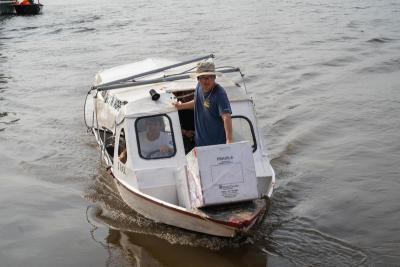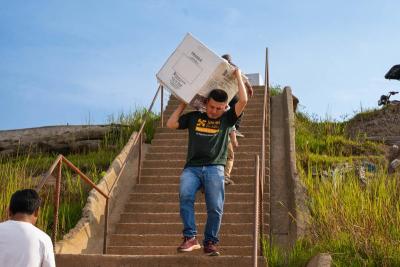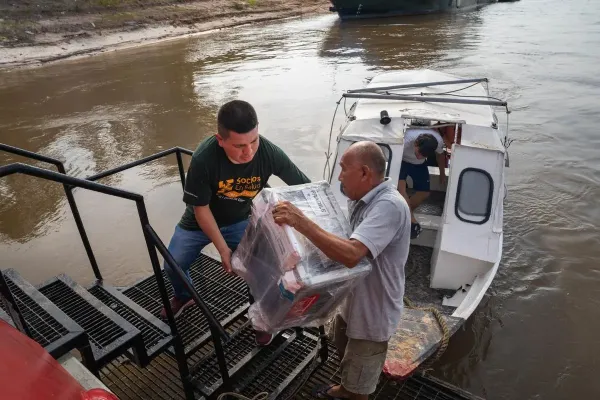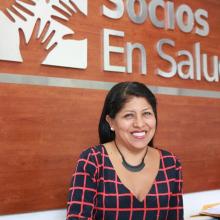Miguel Apolinario does not remember ever having worked under such extreme temperatures as those in Loreto, a region located in northeastern Peru, in the heart of the Amazon.
“I checked my cellphone and the temperature was 36 °C [96 °F],” he recalls.
Apolinario, a nurse technician, had come to the region on a distinct mission: to find people at-risk for tuberculosis and offer free screenings.
Tuberculosis (TB) is the world’s deadliest infectious disease, disproportionately affecting people in low- and middle-income countries, where treatment and care are routinely inaccessible. Early detection is critical in responding to tuberculosis, which can go undetected for years. But finding these cases is challenging, especially in communities like Loreto.
Located in the Amazon rainforest, Loreto is home to 1 million people, including 32 Indigenous groups in 1,200 communities. It’s one of the largest regions of Peru, bordering three countries: Ecuador, Colombia, and Brazil. It’s also one of the hottest, with temperatures routinely in the 90s (Fahrenheit). Filled with forests, swamps, and rivers, Loreto is isolated. Its capital, Iquitos, is not accessible by land—the only way to visit it is by plane or boat.
These conditions, along with systemic injustice, have made formal health care mostly inaccessible in Loreto. As a result, the region has been among the hardest-hit by diseases like TB. While TB cases in Peru have largely been diagnosed in Lima and Callao, which together report 56% of cases nationwide, Loreto’s incidence rate is 164 cases per 100,000 people—higher than the incidence rate in both major cities.
To address this unmet need, Socios En Salud, as Partners In Health is known in Peru, has been expanding its TB work to include remote regions like Loreto. That work stems from its decades of experience responding to TB in partnership with the Ministry of Health and local communities, ever since its founding in 1996.
As the latest chapter in innovative TB work that has ranged from mobile clinics to portable x-ray screening that fits in a backpack, Socios En Salud launched a 10-day active search campaign in Loreto. The campaign had an ambitious goal: screen hundreds of people across 18 communities.

The communities where Socios En Salud provided free TB screenings are only accessible by boat.
Photo by Monica Mendoza / Partners In Health Canada.
An Unmet Need
In mid-November, Apolinario and colleagues Alexander Gutiérrez, a radiologist, and Juan Herrera, a lab technician, traveled by boat across the Amazon river basin.
In the boat, the health workers brought ultra-portable, AI-powered digital radiography equipment, enabling them to screen and evaluate patients within minutes.
They didn’t know how receptive the communities would be. But their presence was expected—weeks ago, Socios En Salud had sent former TB patients to the communities to promote the screenings and register patients.
Each day began at 7:30 a.m., when the medical vessel docked in a community. The team provided dozens of free screenings using the radiography equipment. If a patient had an abnormal result, the team would request a sputum sample for the GeneXpert molecular test, providing a rapid TB diagnosis within two hours.
Over the course of 10 days, the team screened a total of 369 people. For those who tested positive, the plan was to provide them with economic assistance to travel to the nearest health center where TB care was available.
“These are people who in some cases had not set foot in a health center for years,” says Apolinario. “Most of them had never had a TB screening in their lives.”
Peru’s last national census in 2017 revealed that 61% of Indigenous communities lacked any health facility. Only 1 of the 18 communities Apolinario visited, Colonia Oran, had a health post.
The lack of health care only adds to the challenges for communities in Loreto, where as many as 36% of people live in poverty.
“The department of Loreto, just like all regions of the Peruvian jungle, are affected by health and environmental problems, which lead to poverty and malnutrition, in addition to limited access of the population to health facilities due to distance and resources,” says Milagros Mendoza, project coordinator of Socios En Salud’s TB Program.

Socios En Salud provided free TB screenings throughout Loreto for 10 days.
Photo by Monica Mendoza / Partners In Health Canada.
Because of the lack of formal health services, people in the communities often resort to natural medicine and traditional healing practices.
“They told me that, in the old days, there were people with TB who refused medications and treated themselves with the sap from bananas and trees,” he says.
As Socios En Salud and others work to expand health care access in the region, the times are changing. But despite the technological advances in TB care, challenges remain in getting that care to patients who need it.
Even during their 10-day intervention, Apolinario and his team faced hurdles.
“Sometimes there were no community health workers,” he recalls. “So Alexander, the radiologist, and I would have to get off the boat, use the light from our cellphones to see the road, and look for people, especially the elderly, who were waiting for their [test] results at home, and we delivered it to them directly.”
Still, the team persisted, connecting hundreds with screening and care, including, for those diagnosed, accompaniment by a community health worker and free transportation to a clinic.
The intervention in Loreto marked a step forward for TB care in the region.
“There were people asking when we were coming back, because they wanted to bring more family members,” he says. “They were very grateful.”

